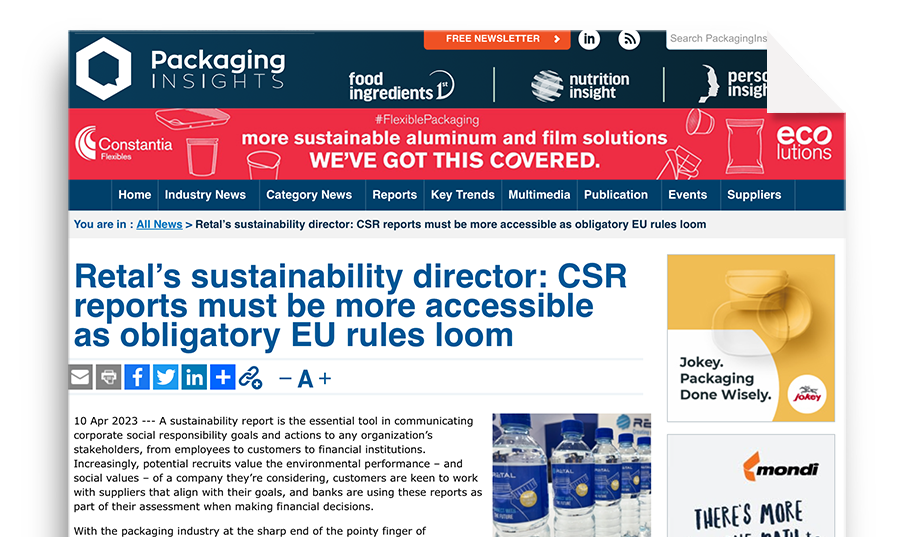
10 Apr 2023 --- A sustainability report is the essential tool in communicating corporate social responsibility goals and actions to any organization’s stakeholders, from employees to customers to financial institutions. Increasingly, potential recruits value the environmental performance – and social values – of a company they’re considering, customers are keen to work with suppliers that align with their goals, and banks are using these reports as part of their assessment when making financial decisions. With the packaging industry at the sharp end of the pointy finger of sustainability for some time, it makes perfect sense that packaging manufacturers take creating and publishing their sustainability reports seriously.
A recent report from global management consulting firm McKinsey calls the global megatrend of sustainability in packaging a “general awakening” that shows no sign of slowing down, with all packaging manufacturers and brands that source packaging needing to “implement processes to address future requirements proactively.”
This appreciation of the seriousness of sustainability in packaging is also reflected in the report’s analysis that “83% of the legal measures relating to sustainable packaging worldwide focus on plastics,” with plastic beverage packaging leading the way in terms of accountability, according to the report.
The global beverage brands that use plastic packaging know that the quantifiable sustainability of their products, which is largely governed by the packaging, is a major factor in consumer choice, so it makes sense that these brands are driving their packaging suppliers to publish an annual sustainability report in a recognized format.
Creating an obligation
With so much at stake, it’s understandable that plastic packaging manufacturers for the F&B industry want to be sure that their annual sustainability reports are accurate, easy to understand, and effectively communicate their position and mitigating actions regarding their environmental and social impacts, even before the EU Directive makes it an obligation. Emmanuel Duffaut is the sustainability director at Retal, a multinational plastic packaging producer serving many leading food and beverage brands. Duffaut has seen how the company’s annual sustainability report has evolved since he joined in 2018, tasked with defining and driving its sustainability actions.
He explains: “Producing a sustainability report is a massive undertaking – you must provide a significant amount of data and information in a way that is easy to read and which provides an accurate image of the company.”
“Everything starts with the collection and aggregation of data and information from each of our 12 plants throughout the year to answer the indicators required by the GRI standard. Then you must build the narrative of the report around how we manage CSR and our goals,
actions and results in the different sustainability topics.”
“Last but not least, you must make the report appealing and reader-friendly, easy to navigate, highlighting the key information and data in
each section and providing a positive image of Retal. Retal collaborates with professional writers and designers to ensure that its report will deliver its CSR information to all its stakeholders in the best possible way. In that respect, we also provide an executive summary.”
Read online in Packaging Insights
Read / Download in PDF